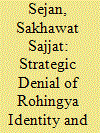| Srl | Item |
| 1 |
ID:
078976


|
|
|
|
|
| Publication |
2007.
|
| Summary/Abstract |
This paper analyzes factors contributing to terrorism, using its initial meaning from the French Revolution in which the state is the terrorist. The independent economic variables are mineral exports/GDP, military expenditures/GDP, real GDP growth, real per capita GDP, and population density, and the dependent variable is democide, the murder of people by government. Analysis of the data indicates that mineral exports and poor economic performance (both level and growth of income) increase the probability of democides. However, once regime type (democracy) is controlled for, only mineral exports remain statistically robust. Therefore, the control of rents seems to be a major factor contributing to democides
|
|
|
|
|
|
|
|
|
|
|
|
|
|
|
|
| 2 |
ID:
187366


|
|
|
|
|
| Summary/Abstract |
Denying the identity of a race is the step towards committing the crime of genocide, which may also result in ethnic cleansing. This article has tried to strategically depict the nexus between the identity denial and ethnic cleansing of Rohingyas. From the very inception to now, the gradual development of ignoring the identity of Rohingyas is evident to deny their rights. Also, Buddhist extremism has outnumbered the demands of Rohingya as an ethnicity among 144 races of Myanmar. Then, it has claimed the proposition that might become applicable for their internal recognition, which is ‘right to internal self-determination’. This article also discusses the development of the Gambia versus Myanmar case, which may contribute to the resurrection of Rohingya identity within the lands of Myanmar. Internal recognition of the Rohingyas under the legal instruments of Myanmar will restore their fundamental rights along with their political and social recognition.
|
|
|
|
|
|
|
|
|
|
|
|
|
|
|
|